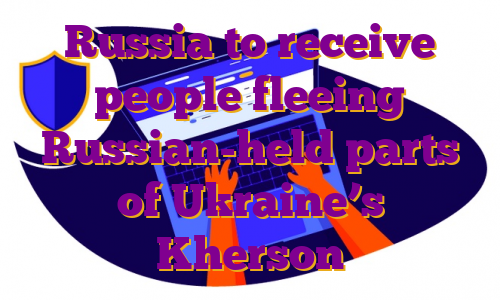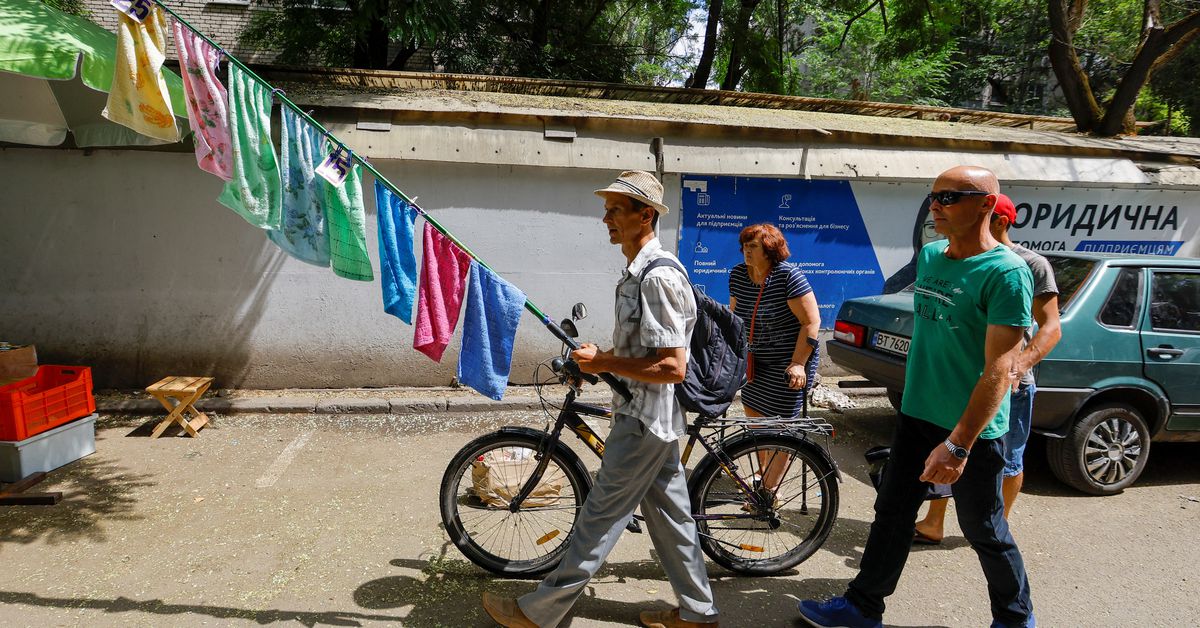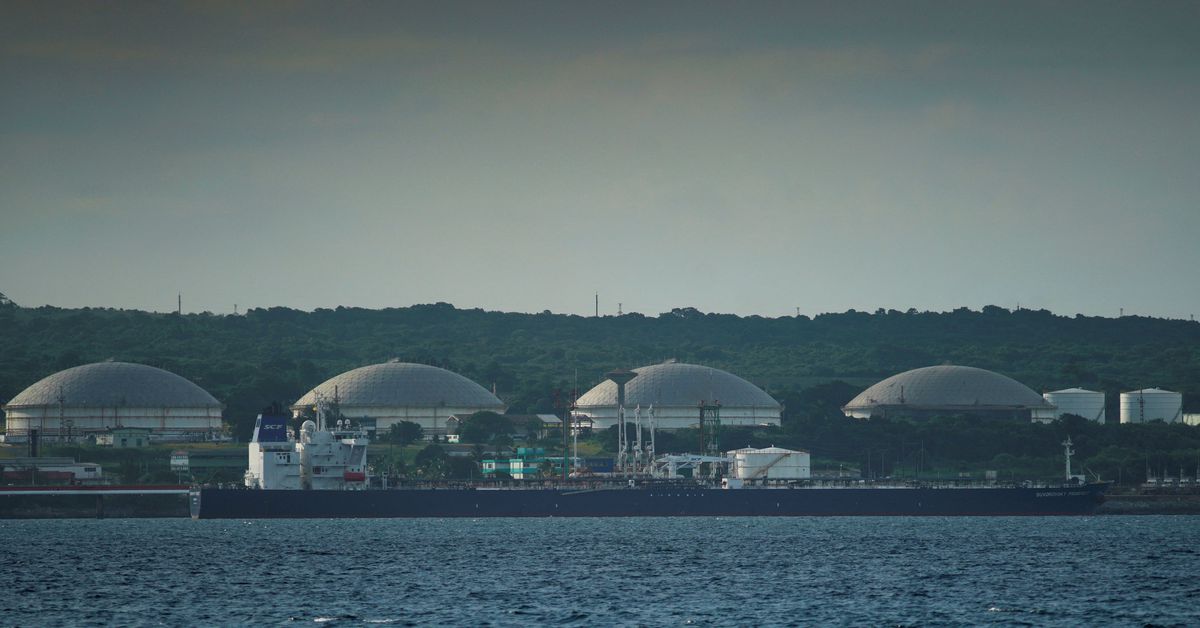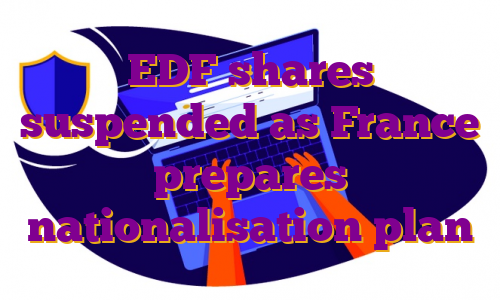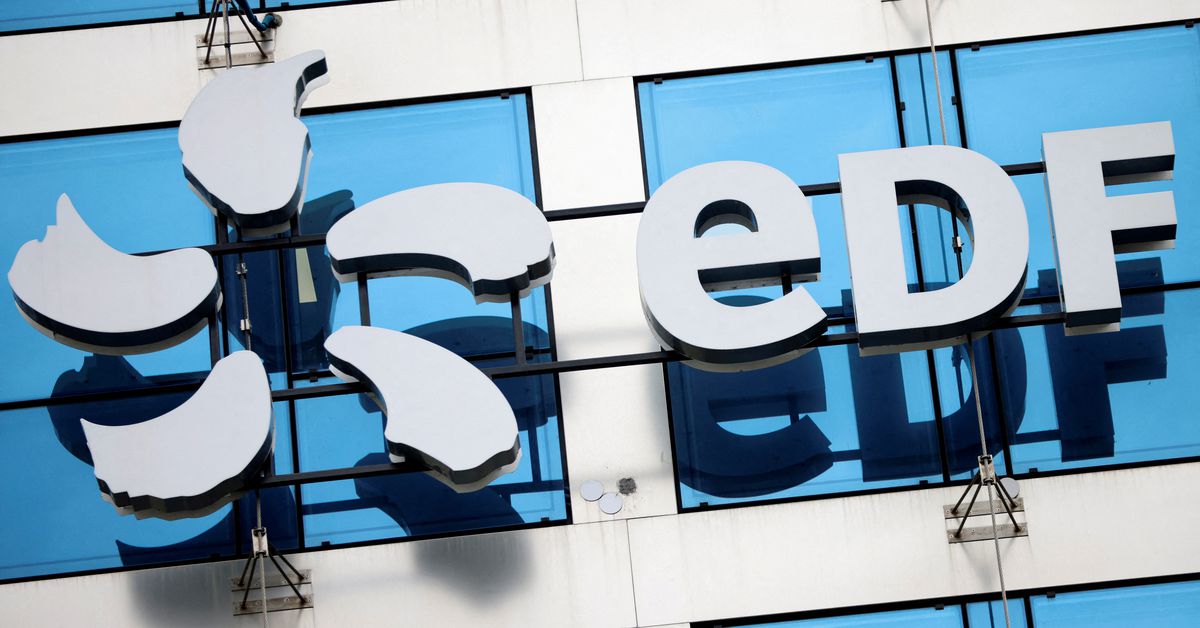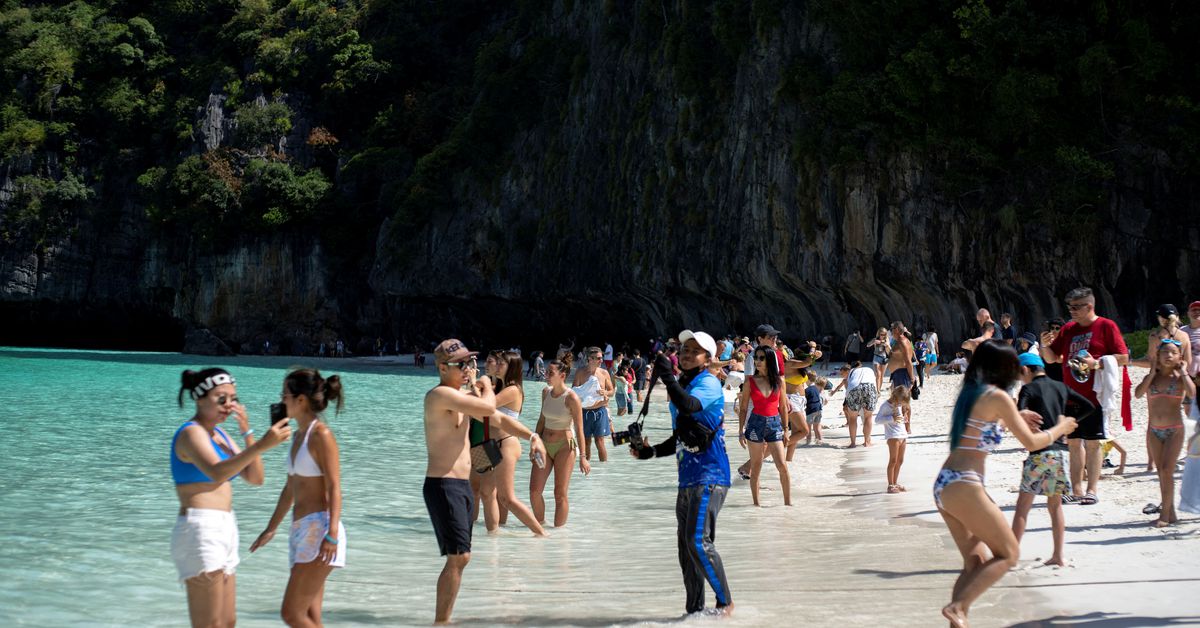LONDON, Oct 13 (Reuters) – A Russian region adjoining Ukraine said it was preparing to receive refugees from the Russian-held part of Ukraine’s Kherson province, after its Russian-appointed leader proposed on Thursday that residents leave to seek safety as Ukrainian forces advance.Most of the Kherson region was seized in the first days of Russia’s invasion as it sent in troops from adjoining Crimea. It is one of four partly occupied Ukrainian regions that Russia proclaimed as its own last month in a move overwhelmingly condemned on Wednesday by the U.N. General Assembly.However, since August it has been the scene of a major advance by Ukrainian forces.Register now for FREE unlimited access to Reuters.comIn a video statement on Telegram, Vladimir Saldo publicly asked for government help in moving civilians to safer regions of Russia.”Every day, the cities of Kherson region are subjected to missile attacks,” Saldo said.”As such, the leadership of Kherson administration has decided to provide Kherson families with the option to travel to other regions of the Russian Federation to rest and study,” he said, adding that people should “leave with their children”.He said the suggestion applied foremost to residents on the west bank of the Dnipro River – an area that includes the regional capital, Kherson.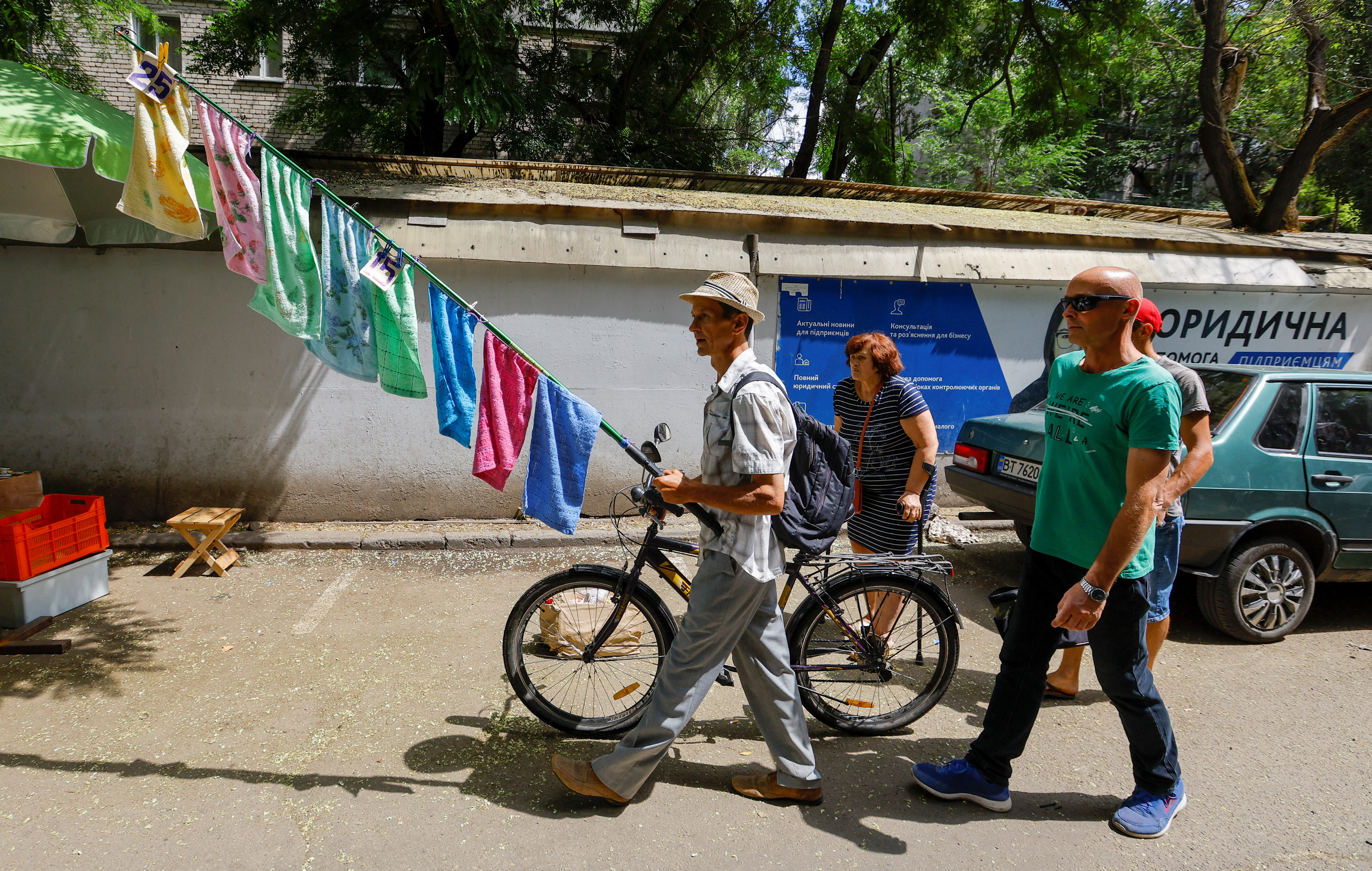 Local residents visit a street market during Ukraine-Russia conflict in the Russia-controlled city of Kherson, Ukraine July 26, 2022. REUTERS/Alexander Ermochenko”But at the same time, we suggested that all residents of the Kherson region, if there is such a desire, to protect themselves from the consequences of missile strikes, also go to other regions.”The TASS news agency quoted the governor of Russia’s Rostov region, Vasily Golubev, as saying that a first group of people from Kherson would arrive there on Friday.”The Rostov region will accept and accommodate everyone who wants to come to us from the Kherson region,” he said.Russian Deputy Prime Minister Marat Khusnullin said those leaving Kherson would be provided with free accommodation and necessities – and, if they decided to remain outside Kherson permanently, with housing.Russia’s incorporation of the four regions has been denounced by Kyiv and the West as an illegal annexation like that of Crimea, which Russia seized in 2014. At the U.N. General Assembly, 143 of 193 countries condemned it in Wednesday’s vote.Ukrainian authorities say hundreds of thousands of Kherson’s residents have fled, mostly to unoccupied parts of Ukraine, including half the pre-war population of the regional capital.Any major territorial losses in Kherson would restrict Russia’s access to the Crimean peninsula further south, whose return Kyiv has coveted since 2014.Register now for FREE unlimited access to Reuters.comReporting by Reuters; Editing by Kevin Liffey, Mark Trevelyan and Sandra MalerOur Standards: The Thomson Reuters Trust Principles. .
Local residents visit a street market during Ukraine-Russia conflict in the Russia-controlled city of Kherson, Ukraine July 26, 2022. REUTERS/Alexander Ermochenko”But at the same time, we suggested that all residents of the Kherson region, if there is such a desire, to protect themselves from the consequences of missile strikes, also go to other regions.”The TASS news agency quoted the governor of Russia’s Rostov region, Vasily Golubev, as saying that a first group of people from Kherson would arrive there on Friday.”The Rostov region will accept and accommodate everyone who wants to come to us from the Kherson region,” he said.Russian Deputy Prime Minister Marat Khusnullin said those leaving Kherson would be provided with free accommodation and necessities – and, if they decided to remain outside Kherson permanently, with housing.Russia’s incorporation of the four regions has been denounced by Kyiv and the West as an illegal annexation like that of Crimea, which Russia seized in 2014. At the U.N. General Assembly, 143 of 193 countries condemned it in Wednesday’s vote.Ukrainian authorities say hundreds of thousands of Kherson’s residents have fled, mostly to unoccupied parts of Ukraine, including half the pre-war population of the regional capital.Any major territorial losses in Kherson would restrict Russia’s access to the Crimean peninsula further south, whose return Kyiv has coveted since 2014.Register now for FREE unlimited access to Reuters.comReporting by Reuters; Editing by Kevin Liffey, Mark Trevelyan and Sandra MalerOur Standards: The Thomson Reuters Trust Principles. .
U.S. says Russia price cap should take risk premium out of oil market
Liberia-flagged Aframax tanker Suvorovsky Prospect discharges fuel oil from Russia at the Matanzas terminal, in Matanzas, Cuba, July 16, 2022. REUTERS/Alexandre Meneghini/File PhotoRegister now for FREE unlimited access to Reuters.comSINGAPORE/WASHINGTON, Sept 9 (Reuters) – The price cap that G7 countries want to impose on Russian oil to punish Moscow should be set at a fair market value minus any risk premium resulting from its invasion of Ukraine, a U.S. Treasury Department official told reporters on Friday.The price should be set above the marginal production cost of Russia’s oil and take into consideration historical prices, said Elizabeth Rosenberg, U.S. Treasury Assistant Secretary for Terrorist Financing and Financial Crimes.The G7 price cap plan agreed last week calls for participating countries to deny insurance, finance, brokering and other services to oil cargoes priced above a yet to be set price cap on crude and two oil products. read more Register now for FREE unlimited access to Reuters.comRosenberg said services providers would not have to police price cap compliance themselves but could rely on the attestations of buyers and sellers, leaving enforcement to participating jurisdictions.She said the G7 countries – Britain, Canada, France, Germany, Italy, Japan and the United States – would work together in coming weeks to determine the capped price and other key implementation details.”There are several key data points we are considering and how the prices should ultimately be set and that includes the marginal cost of production for Russian oil,” Rosenberg told a briefing call held for media in Asia.”The price cap price should be … in line or consistent with historical prices accepted by the Russian market.”That could imply a potential cap of around $60 a barrel, experts say, as Russian Urals crude, based off of benchmark Brent, sold for $50 to $70 a barrel in 2019.Russian government documents have identified a marginal crude production cost of $44 per barrel, although some Western officials believe it may be somewhat lower.A European official said G7 members had not begun formal discussions about the price cap, although officials had “notions” about what was possible.”The idea is that you still incentivize Russian oil producers to export by guaranteeing a price in line with their cost of production with a small incentive,” the official said.U.S. Treasury Secretary Janet Yellen and other Biden administration officials have been travelling to oil consuming countries to promote a mechanism that seeks to cut Russia’s oil export revenues, the lifeblood of its war machine, without reducing volumes of Russian shipments to global markets.Russian President Vladimir Putin has said Russia would halt shipments to countries that impose the price cap. read more Putin says Russia is conducting a “special military operation” in Ukraine to protect his country’s security against expansion of the Western military alliance NATO. read more Register now for FREE unlimited access to Reuters.comReporting by Florence Tan in Singapore, and David Lawder, Timothy Gardner and Andrea Shalal in Washington; Writing by Timothy Gardner and David Lawder; Editing by Christian Schmollinger and Tom HogueOur Standards: The Thomson Reuters Trust Principles. .
Analysis: Brazil risk premium soars after Congress breaks spending cap
BRASILIA, July 22 (Reuters) – Brazilian fixed-income markets are pricing in the highest risk levels in years, raising red flags among investors and government officials who see little relief in sight.While global interest rate hikes and recession risks have put all emerging markets under pressure, Brazil faces special scrutiny after Congress cracked open a constitutional spending cap to allow a burst of election-year expenditures. read more “The problem is the change in the spending cap,” said an Economy Ministry official, who requested anonymity to discuss the situation openly. “It weakens the reading that the fiscal situation will be under control in the coming years.”Register now for FREE unlimited access to Reuters.comEven with positive surprises such as strong June tax revenue data on Thursday, the official said Brazil’s yield curve remains under pressure as investors brace for the worst. read more Both major presidential candidates on the ballot in October – leftist former President Luiz Inacio Lula da Silva and right-wing incumbent Jair Bolsonaro – have signaled they plan to extend this year’s boost in social spending into next year.”It’s a fiscal bomb,” said Sergio Goldenstein, chief strategist at Renascença DTVM. “Risk premiums look high, but there is little room for a relevant drop.”The real rate for inflation-linked government bonds has been running at the highest level since late 2016, while Brazil’s five-year credit default swaps are at highs last seen at the beginning of the pandemic in March 2020.Concerns about Brazil’s credit profile come as commodity shocks from the war in Ukraine rattle the global economy and contribute to inflation, prompting rich nations to start raising interest rates.”All the credit spreads in the world are opening, our bonds are not immune to that,” said Ronaldo Patah, chief strategist at UBS Consenso.In fact, Brazil’s strong exports of grains, oil and iron ore give it some advantages compared to other emerging markets riding out the current surge in commodity prices, independent of the political risks in Brasilia now rattling investors.Brazil’s central bank also got an early start hiking rates compared to most peers, raising its benchmark interest rate from a record low 2% in March 2021 to 13.25% currently, with another hike penciled in for August to curb double-digit inflation.Most of the market has therefore been betting on rate cuts supporting growth from the middle of next year. However, risk premiums now point to rates above 13% in the yield curve for maturities ranging from 2024 to 2033, while mid-2023 vertices indicate an accumulated rate above 14%.”I am struck by this process of (yield curve) flattening that we are seeing at a very high level”, said the chief economist at Ativa Investimentos Etore Sanchez.Roberto Dumas, chief strategist at Banco Voiter, said Brazil is caught between a central bank tightening rates while the government is finding new ways to boost spending.”The more one accelerates, the more the other needs to step on the brakes. Everyone is projecting more and more that the Selic will rise more than expected”, said Dumas, who foresees the benchmark rate at 14.25% at the end of this year.Register now for FREE unlimited access to Reuters.comReporting by Marcela Ayres and Jose de Castro
Editing by Brad HaynesOur Standards: The Thomson Reuters Trust Principles. .
EDF shares suspended as France prepares nationalisation plan
View of the company logo of Electricite de France (EDF) on the facade of EDF’s headquarters in Paris, France, July 7, 2022. REUTERS/Johanna GeronRegister now for FREE unlimited access to Reuters.com
- French government aiming to fully nationalise EDF
- State already holds an 84% stake in the group
- Utility grappling with outages and tariff caps
PARIS, July 13 (Reuters) – Shares in debt-laden EDF (EDF.PA) were suspended on Wednesday as the French government prepares to detail its plans to fully nationalise Europe’s biggest nuclear power operator.France said last week it wanted to fully nationalise EDF, in which the state already holds an 84% stake, without explaining how it would do so. In a statement, the finance ministry said it would clarify its plans before the market opens on July 19 at the latest.Taking EDF back under full state control would give the government greater licence to restructure the group that runs the nation’s nuclear power plants, as it contends with a European energy crisis.Register now for FREE unlimited access to Reuters.comA finance ministry source said the suspension of EDF shares, which was requested by the company, was temporary and trading would resume once the government had made clear how it would fully nationalise the utility.EDF has been grappling with extraordinary outages at its nuclear fleet, delays and cost overruns in building new reactors, and power tariff caps imposed by the government to shield French consumers from soaring electricity prices.Two sources told Reuters this week that the government was poised to pay up to 10 billion euros to buy the 16% stake in the group it does not already own, after including the purchase of convertible bonds and a premium it is expected to offer to minority shareholders. read more That would translate into a buyout price of close to 13 euros per share, a 30% premium to current market prices but still a big loss for long-term shareholders, as the group was listed in 2005 at a price of 33 euros per share.”A 30% premium does not seem unreasonable given the market fluctuations of the share price – we are still talking about a 50% to 60% loss for shareholders,” said Antoine Fraysse-Soulier, head of market analysis at eToro in Paris.The sources said the state wanted to move quickly and would probably launch a voluntary offer on the market rather than push a nationalisation bill through parliament, with the aim of closing the operation in October-November.”The government may want to offer a sufficient premium to avoid legal challenges and resulting delays to the offer,” JPMorgan analysts said in a note.EDF did not give a reason for requesting the suspension of its shares, which have risen 30% since the nationalisation announcement, increasing the cost of buying out minorities. The finance ministry source said the move was “among routine tools to manage financial markets in this kind of situation”.”I would imagine it is to stop the price going up to a point that the French government ends up having to pay over the odds for the remaining shares in issue,” a London trader said.The shares closed at 10.2250 euros on Tuesday.In a sign of how badly reactor outages are affecting the company, which is expected to post a loss this year, EDF said power generation at its French nuclear reactors fell by 27.1% in June from a year earlier after the discovery of stress corrosion took several sites off line.EDF has said it expects an 18.5 billion euro hit to its earnings in 2022 from production losses, and further losses of 10.2 billion euros from the energy price cap.($1 = 0.9964 euros)Register now for FREE unlimited access to Reuters.comAdditional reporting by Joice Alves in London and Marc Angrand in Paris; Writing by Silvia Aloisi; Editing by Edmund Blair, Jan Harvey, Kirsten DonovanOur Standards: The Thomson Reuters Trust Principles. .
‘Sell premium’ – Thailand discourages discounts, wants high value tourists
Tourists visit Maya bay after Thailand reopened its world-famous beach after closing it for more than three years to allow its ecosystem to recover from the impact of overtourism, at Krabi province, Thailand, January 3, 2022. Picture taken January 3, 2022. REUTERS/Athit Perawongmetha/File PhotoRegister now for FREE unlimited access to Reuters.comBANGKOK, July 4 (Reuters) – Thailand’s hotels, businesses and private hospitals should refrain from offering big discounts to lure tourists and focus instead on raising the country’s value as a premium travel destination, government ministers said on Monday.Thailand has received about 2 million foreign visitors in the first six months of this year, a steady revival after its tourism industry almost collapsed due to the pandemic and more than 18 months of complex and costly entry requirements.”We cannot let people come to Thailand and say because it’s cheap,” Deputy Prime Minister Anutin Charnvirakul said at an event at Bangkok’s main international airport to promote tourism.Register now for FREE unlimited access to Reuters.com“Instead they should say ‘because it works, it’s reasonable’, that’s where we can increase value,” he said, echoing remarks by the country’s tourism minister.Anutin likened the approach to that of luxury fashion brand Louis Vuitton.”Hold your ground. Sell premium. The more expensive, the more customers,” he said. “Otherwise Louis Vuitton wouldn’t have any sales.”One of Asia’s most popular travel destinations, Thailand welcomed a record of nearly 40 million visitors in pre-pandemic 2019, who spent 1.91 trillion baht ($53.53 billion), equivalent to 11% of gross domestic product.Arrivals slumped to 6.7 million the following year, and down to 428,000 in 2021, despite calibrated moves to end quarantine requirements.It is forecasting 10 million foreign arrivals in 2022.Earlier this year, Thailand launched a long-term visa programme for wealthy foreigners and skilled workers, sticking to its plan to lure high-spending visitors, despite major jobs and business losses in tourism during the pandemic.($1 = 35.6500 baht)Register now for FREE unlimited access to Reuters.comReporting by Chayut Setboonsarng and Panarat Thepgumpanat; Editing by Martin PettyOur Standards: The Thomson Reuters Trust Principles. .

